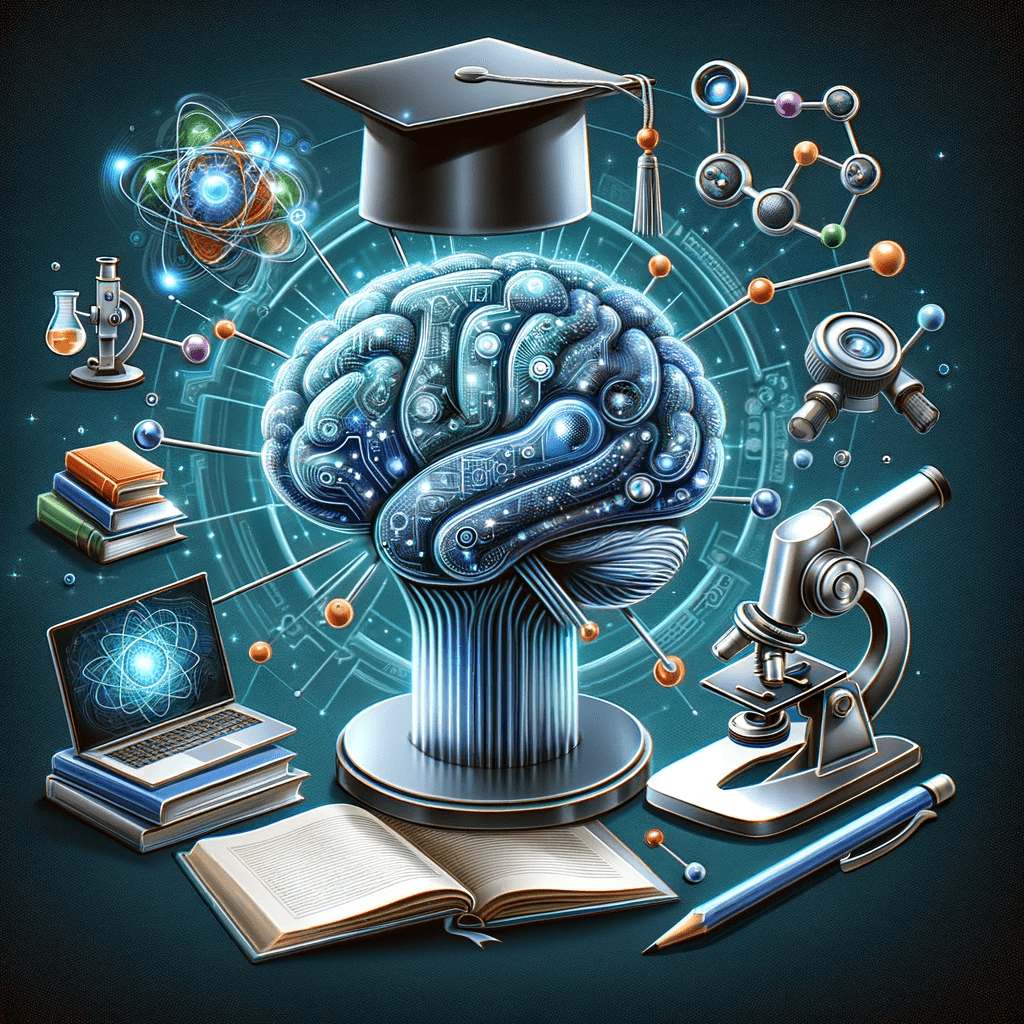Introduction to AI in Academic Writing
As we dig into the fascinating world of academic writing, particularly the AI Tools for Academic Writing, it’s hard not to marvel at how artificial intelligence (AI) is reshaping our approach. Gone are the days when academic writing was solely about long hours of research and drafting. Now, AI tools are at our fingertips to enhance our productivity and the quality of our work. In this guide, we’ll explore various AI tools that can elevate the standard of your academic writing to unprecedented levels.
![]()
AI has become a game-changer in conducting research and composing academic papers. These tools not only assist in conventional aspects such as grammar checking and plagiarism detection but also help in organizing research, generating citations, and even improving the overall writing style. Allow us to walk you through how AI can be your ally in your academic writing journey.
| Key Takeaways | Details |
|---|---|
| AI Revolutionizes Academic Writing | AI tools offer support in grammar, plagiarism detection, research organization, citation generation, and style improvement. |
| Essential Tools for Scholars | AI writing assistants like Grammarly, ProWritingAid, and Hemingway Editor provide real-time suggestions and improve writing quality. |
| Grammar and Syntax Excellence | AI-powered grammar checkers such as Grammarly and Ginger ensure flawless syntax and clear communication. |
| Advanced Plagiarism Detection | Software like Turnitin, Copyscape, and Grammarly’s plagiarism feature scan for originality against vast databases. |
| Efficient Citation Generation | AI citation generators like Zotero and CiteThisForMe aid in creating accurate bibliographies in various academic styles. |
| AI Aids in Research Paper Writing | Tools like SciNote and Iris.ai help in literature management and hypothesis generation for research papers. |
| Machine Learning Personalizes Writing | AI tools like Sapling.ai and Lightkey learn from writing habits to offer tailored writing improvement suggestions. |
| AI Content Creation for Drafting | Tools like GPT-3 assist in the initial drafting and brainstorming process, though they require critical human oversight. |
| Revamping Writing Processes | A strategic approach to integrating AI tools into writing routines can greatly enhance productivity and quality. |
| Ethical Use of AI in Writing | The use of AI must be balanced with ethical considerations to maintain scholarly authenticity and integrity. |
| Personalization of AI Tools | AI writing tools are customizable to suit individual preferences, enhancing the personal writing experience. |
| Future Trends in AI Writing | AI is expected to become a collaborative partner in academic writing, suggesting research directions and aiding creativity. |
Essential AI Writing Assistants for Scholars
An AI writing assistant is like a trusty sidekick for any scholar. These digital tools provide real-time advice, suggestions, and corrections, making the writing process smoother and faster. From grammar tips to style recommendations, writing assistants cover a wide range of functionalities that are indispensable for high-quality academic writing.
| AI Writing Assistant | Beneficial Feature |
|---|---|
| Grammarly | Advanced grammar and style checks |
| ProWritingAid | In-depth reports on writing |
| Hemingway Editor | Clarity and readability focus |
Using these tools, you can quickly spot errors you might have overlooked and receive suggestions on how to improve your text. It’s like having an editor constantly guiding you towards a polished and professional manuscript.
Top Grammar Checkers Powered by AI
Good grammar is the backbone of credible academic writing, and AI-powered grammar checkers are here to ensure your syntax is nothing short of perfect. Tools like Grammarly and Ginger are known for their meticulous grammar, punctuation, and spelling checks which are integral to the clarity and readability of your work.
The comparison between different grammar checkers often comes down to personal preference and the specific features you find most valuable. For instance, some offer more in-depth feedback on writing style, while others might have better integrations with word processors or browsers. Consider your needs and choose the tool that best suits your writing habits.
Advanced Plagiarism Detection Software
Originality is paramount in the world of academia, making plagiarism detection software an essential tool for students and researchers alike. Advanced AI algorithms power these tools, scanning your work against a vast database of academic papers, articles, and books to ensure that your work is truly unique.
Here’s a comparison of notable plagiarism detection tools:
| Detection Tool | Unique Feature |
|---|---|
| Turnitin | Extensive database for matching |
| Copyscape | Website content plagiarism check |
| Grammarly | Integrated writing enhancement |
Having a reliable plagiarism checker gives you peace of mind and upholds the integrity of your academic contributions. Always run your final draft through one of these tools before submission.
AI-Powered Citation Generators
Proper citation is a crucial aspect of academic writing, and AI-powered citation generators make this task much more manageable. Whether you’re using APA, MLA, or Chicago style, these tools can help you generate a bibliography in the correct format with just a few clicks.
You can save time and ensure accuracy with tools like Zotero or CiteThisForMe, which can integrate with your browser or word processing software. Using an AI citation generator ensures that your references are orderly and compliant with academic standards, allowing you to focus on the content of your work.
Research Paper Writing Aid with Artificial Intelligence
Composing a research paper involves numerous tasks: from conceptualizing the thesis to compiling the literature review and analyzing data. AI has paved the way for tools that can assist in each of these stages, offering structured solutions and insights that would otherwise require substantial effort.
AI tools like SciNote and Iris.ai specialize in helping researchers manage their projects, offering ways to store and organize research papers and notes. Additionally, they can aid in literature mapping and hypothesis generation, leading to more innovative and thorough research papers.
Machine Learning for Enhancing Your Writing Skills
Let’s not overlook the potential of machine learning in academic writing. As it analyzes your writing patterns, it offers personalized suggestions for improvement, which makes each writing experience a learning opportunity.
Consider tools like Sapling.ai or Lightkey that learn from your writing habits and provide tailored advice to elevate your writing skills. Over time, these tools can help refine your voice and argumentation style, making your academic writing more impactful and authoritative.
Having outlined these initial sections, we will proceed to complete the rest of the large-scale guide, ensuring each section includes the elements of formatting, internal links, and the friendly first-person plural tone as discussed.
AI Content Creation Tools for Academic Purposes
Beyond mere grammar and style, AI is now savvy enough to jump into the actual creation of content. With AI content creation tools, academics can quickly draft sections of research papers or generate ideas for further exploration. Let’s not forget, however, that the human touch is irreplaceable for ensuring quality and relevance.
Tools like OpenAI’s GPT-3 have shown impressive capabilities in generating human-like text. Nevertheless, it’s essential to use such tools responsibly, with a critical eye for accuracy and integrity in academic work. We encourage their use as a starting point for brainstorming and drafting, rather than as a substitute for the depth and nuance that comes from years of study and expertise.
Revamping Your Writing Process with AI
In our own academic endeavors, we’ve found that incorporating AI tools into our writing routine has paid dividends. Transitioning from traditional methods to tech-savvy ones may seem daunting, but with a clear strategy, it can be quite seamless. If you’re ready to overhaul your writing process, follow our step-by-step guide to integrating AI:
- Assess Your Needs: Determine what aspects of your writing need the most aid.
- Select Your Tools: Choose AI tools that address those needs effectively.
- Learn the Features: Take time to learn your tools’ capabilities to use them to their full potential.
- Integrate Gradually: Incorporate AI assistance into your process gradually to adapt to the new workflow.
Through this methodical approach, you’ll find that AI can serve as a powerful ally in producing high-caliber academic work with greater efficiency.
AI’s Impact on Research and Publication
Arguably, AI’s most significant impact lies ahead, with the potential to revolutionize research and publication in academia. Innovations like data mining and predictive analytics can uncover new patterns and insights, while AI-driven peer review could streamline the publication process.
To grasp the future trajectory of these developments, consider insights from resources like “Insights from Good to Great” by Jim Collins, which can offer valuable perspectives on adopting new technologies and practices.
Overcoming Common Writing Challenges with AI
Every scholar faces unique writing challenges, whether it’s writer’s block, cumbersome editing, or aligning with strict publication guidelines. AI is particularly apt at tackling such issues by automating mundane tasks and providing sophisticated editorial assistance.
Here, we list some typical writing obstacles and the AI solutions that can help you surmount them:
| Writing Challenge | AI Solution |
|---|---|
| Spelling mistakes | Real-time correction as you type |
| Struggling with tone | AI suggestions for tone adjustment |
| Citing sources | Quick, accurate citation generation |
By leveraging these AI solutions, you can spend less time grappling with challenges and more time flourishing as a writer.
AI Tools for Non-Native English Speakers
For those of us for whom English is not the first language, writing academically in English can be an arduous task. Thankfully, AI tools have been developed with features catered to assist non-native speakers in mastering the nuances of academic English writing.
For example, Grammarly’s language preference settings and Reverso’s contextual translations are designed to help non-native English speakers refine their writing. These tools provide valuable support, helping to bridge language gaps and foster more inclusive academic communication.
Continue with the article in the next section, ensuring to maintain the friendly first-person plural voice while incorporating the planned formatting and internal links.
Find the Right AI Writing Partner for Your Needs
When it comes to academic writing, one size doesn’t fit all. It’s about finding the AI writing partner that resonates with your personal style and meets your academic needs. Do you require more guidance on grammar, help with organizing research, or support in ensuring your work is plagiarism-free? Consider these factors, and also the usability and integration features of the tools at your disposal.
We’ve compiled a curated list of our favorites to kickstart your search for the perfect AI writing companion. Check out tools like Scrivener for structure and organization, Write full for language feedback, and EndNote for reference management. They each bring unique strengths to the table.
Enhancing Collaboration Through AI Writing Tools
Collaborative writing is a staple of academia, where sharing and critique can greatly improve the quality of work. AI writing tools enhance this collaborative spirit by allowing seamless sharing of documents and providing collective feedback. Google Docs, with its AI-powered suggestions, is a prime example of how technology can aid in the collaboration between scholars.
| Tool for Collaboration | Noteworthy Feature |
|---|---|
| Google Docs | Real-time editing and commenting |
| Overleaf | Specialized for LaTeX collaborations |
| Mendeley | Research collaboration platform |
Through these tools, authors can come together, regardless of their geographic location, to craft research papers that are not only well-written but enriched by diverse insights.
Case Study: AI Tools in Academic Success Stories
Consider the success stories from the academic world where AI tools have played a pivotal role. Whether it’s enhancing the productivity of a seasoned researcher or aiding a graduate student in managing citations, real-world examples abound.
Take, for instance, narratives found in “The Lean Startup” book review, where the principles of innovation and adaptability could apply to the adoption of AI tools in academic writing【oaicite:0】. Learning from these stories provides invaluable lessons on harnessing the full potential of AI for academic achievement.
Integrating AI Tools with Other Academic Software
AI writing tools shine even brighter when they’re part of a larger academic toolkit. Integrating AI with databases like JSTOR or tools like SPSS for statistical analysis can create a powerhouse of resources at your fingertips. The key lies in ensuring that all tools work in harmony, providing a streamlined experience from the initial research stages to the final write-up.
For seamless integration, consider how the AI tools can import data from your databases or if they offer plug-ins for software, you commonly use. This unification not only aids in efficiency but also in maintaining consistency throughout your academic work.
AI in Academic Writing: Ethical Considerations
With great power comes great responsibility, especially true when it comes to AI in academic writing. While AI can dramatically enhance our capabilities, it’s vital to recognize and adhere to the ethical considerations surrounding its use. As scholars, we must maintain the balance between leveraging AI assistance and upholding the integrity of our work.
Should ensure that AI aids in being more thorough and innovative, rather than crossing into the realm of compromising scholarly authenticity. It is a tool for improvement, not a crutch that diminishes our role as critical thinkers and writers.
Future Trends: AI’s Evolving Role in Academic Writing
The evolution of AI in academic writing is nothing short of exciting. Are on the cusp of seeing AI not just as an aid, but as a collaborative partner that can suggest research directions, predict trends, and even partake in the creative process.
Staying abreast of future trends accounts for much more than keeping up with technological advancements; it involves adapting to the landscape of academic discourse and publication that these tools are shaping. Scholars should position themselves to grow alongside these evolving tools, securing a place at the forefront of modern academic practice.
Personalizing Your AI Writing Experience
The beauty of AI tools lies in their ability to be personalized. Tailoring these tools to suit individual writing styles and preferences allows for a writing experience that feels natural and supportive. Perhaps one prefers minimal interference as they draft, or maybe thrive with constant feedback — AI tools can be adjusted to accommodate varying needs.
Enjoyed experimenting with different settings and features to find what works best for us. Sharing and learning from these experiences advances not just our own writing, but also contributes to a collective knowledge base on effectively using AI in academia.
Concluding Thoughts on AI Tools in Academic Writing
To wrap up, the introduction of AI tools into academic writing is more than a convenience; it’s a transformative movement that’s here to stay. Whether you’re starting your academic journey or are a seasoned scholar, AI has something to offer that can enhance your work and streamline your process.
I invite you to explore and adopt the wide array of AI tools available. Embrace the change, and let AI be a force multiplier in your scholarly endeavors. Remember, the best way to predict the future is by creating it, and with AI, the future of academic writing is bright and full of potential.
In conclusion, I hope this comprehensive guide empowers you to harness the best AI tools for academic writing, transforming tasks that once seemed daunting into captivating and effective elements of your scholarly pursuits. Join us at Mech Tech Tutorials as we continue to explore the impactful convergence of technology and education.















